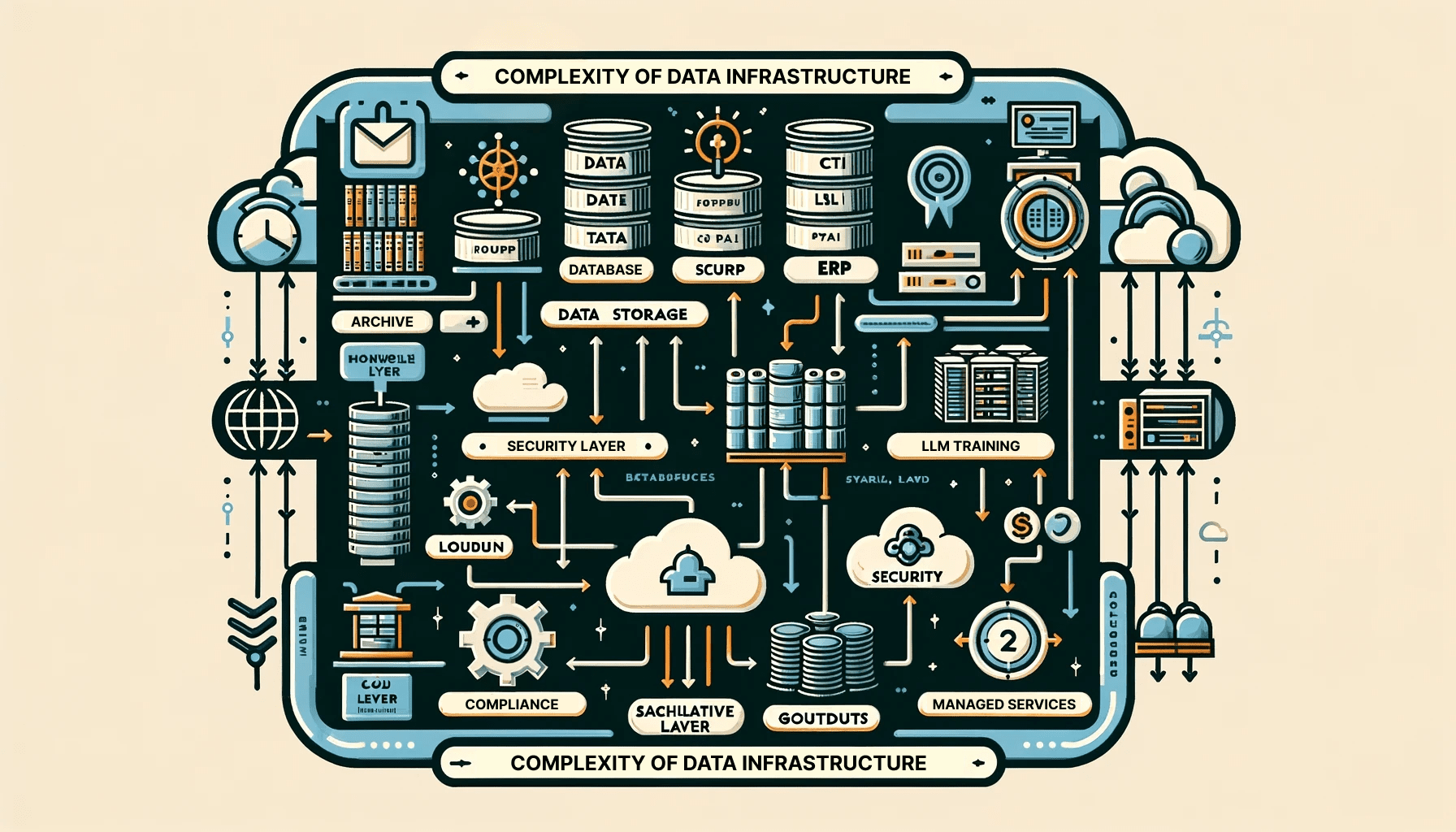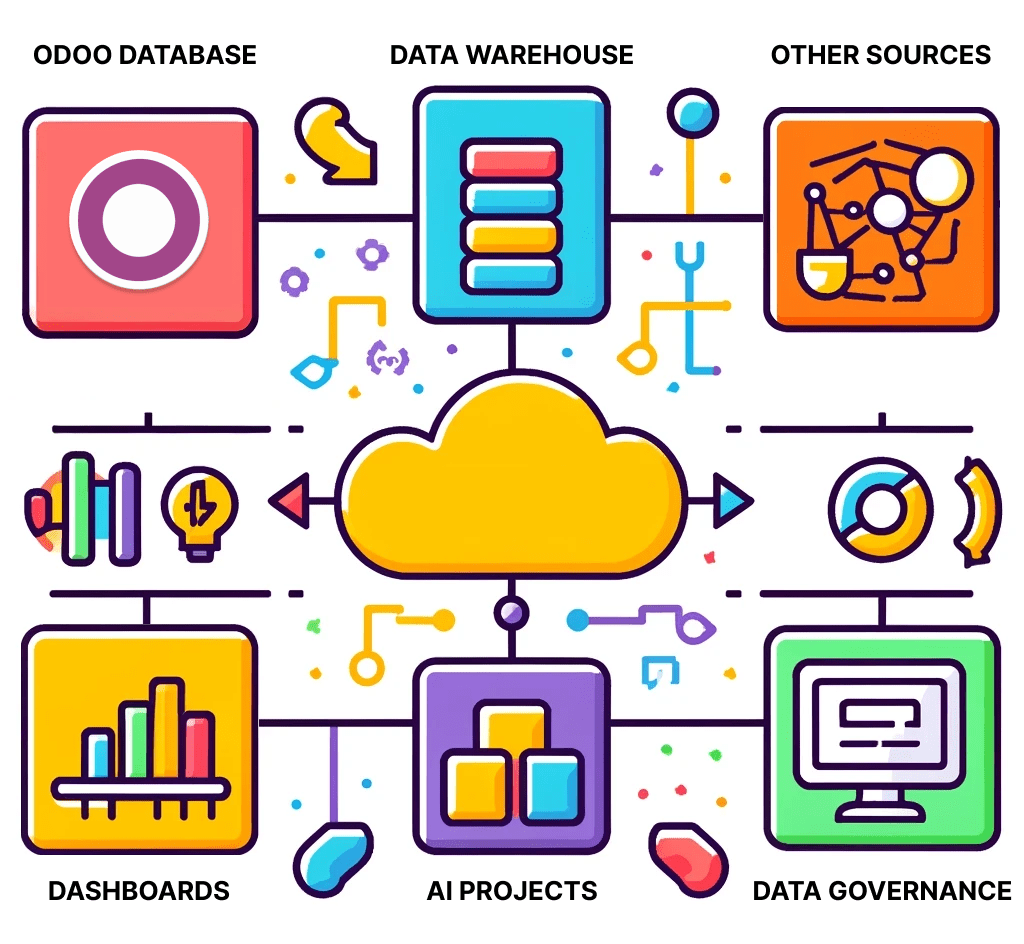The integration of Artificial Intelligence (AI) and Machine Learning (ML) with enterprise systems like Odoo is reshaping modern business landscapes. SMEs preparing for this shift are positioning themselves to capture enormous productivity gains and value.
For instance, a retail business could use integrated data for precise inventory forecasting, avoiding overstocking or stockouts. A manufacturing company could use AI for predictive maintenance, anticipating machinery issues before they disrupt operations.
Central to this operational transformation is the strategic management of data, its accessibility and the robustness of its technical infrastructure. This article covers those foundational elements, considered as the necessary building blocks for the success of AI projects.
The Importance of Infrastructure

A robust technical infrastructure is the backbone of effective AI deployment. For AI models to function optimally, they require not only significant computational power but also advanced data processing tools (like ETL and data quality tools) and secure environments compliant with regulations like GDPR and HIPAA. The evolution of cloud computing has made these technologies more accessible, allowing SMEs to embark on AI projects without the burden of heavy initial investments.
An overview of the critical role of data management in AI, discussed in an article from MIT Technology Review [1], highlights the analogy of data management to the human brain's limbic system, emphasizing its importance for AI's predictive functions (MIT Technology Review).
Data Warehousing and Its Benefits
A data warehouse serves as a central repository for all relevant business data, but it’s an enabler for much more than centralization, which to some extent is already achieved by companies using an ERP system like Odoo that generates a vast volume of operational data, stored in a single database. Indeed, a data warehouse lets you:
- Structure (or re-structure) data, increasing its usability;
- Cleanse data, increasing its quality;
- Cross-reference data from different sources to enrich it and extract more value;
- Make data available for dashboards and algorithms;
- Feed powerful predictive and prescriptive models.
Hence, this centralized approach to data management can enhance efficiency and drive AI or ML projects as they thrive on rich, accessible data. This aligns with the insights from the MIT Sloan Management Review’s "Winning With AI" study [2], which emphasizes the importance of well-designed data warehouses in enterprise-level AI projects.

The Role of Smart Analytics
Tools such as Smart Analytics provide a solution that streamline the process of extracting data from Odoo and pushing it to a data warehouse so it can be used to feed advanced dashboards. This capability not only optimizes the use of data but also lays the groundwork for developing powerful predictive and prescriptive models, essential for data-driven decision-making.
Conclusion
Setting up a strong technical infrastructure that is geared towards data centralization and accessibility is crucial for successfully leveraging AI and ML in businesses of all sizes. Traditionally not included in the infrastructure landscape of SMEs, the data warehouse is becoming increasingly central and almost an essential component for opening the floodgates to advanced, reliable AI-driven business solutions.
Next Steps
Our upcoming article will explore the importance of data volume and quality in AI.
SME owners are invited to join the waiting list for our forthcoming event on AI integration.
For an assessment of your business's AI readiness, explore our "AI Readiness Scorecard" and prepare for the impactful change AI can bring to your business.
[1] Article from MIT Technology Review (https://www.technologyreview.com/2022/04/28/1051009/modern-data-management-the-hidden-brain-of-ai/)
[2] "Winning With AI" from MIT Sloan Management Review and BCG, 2019 MIT Sloan Management Review (https://sloanreview.mit.edu/projects/winning-with-ai/)
The Crucial Role of Infrastructure in AI